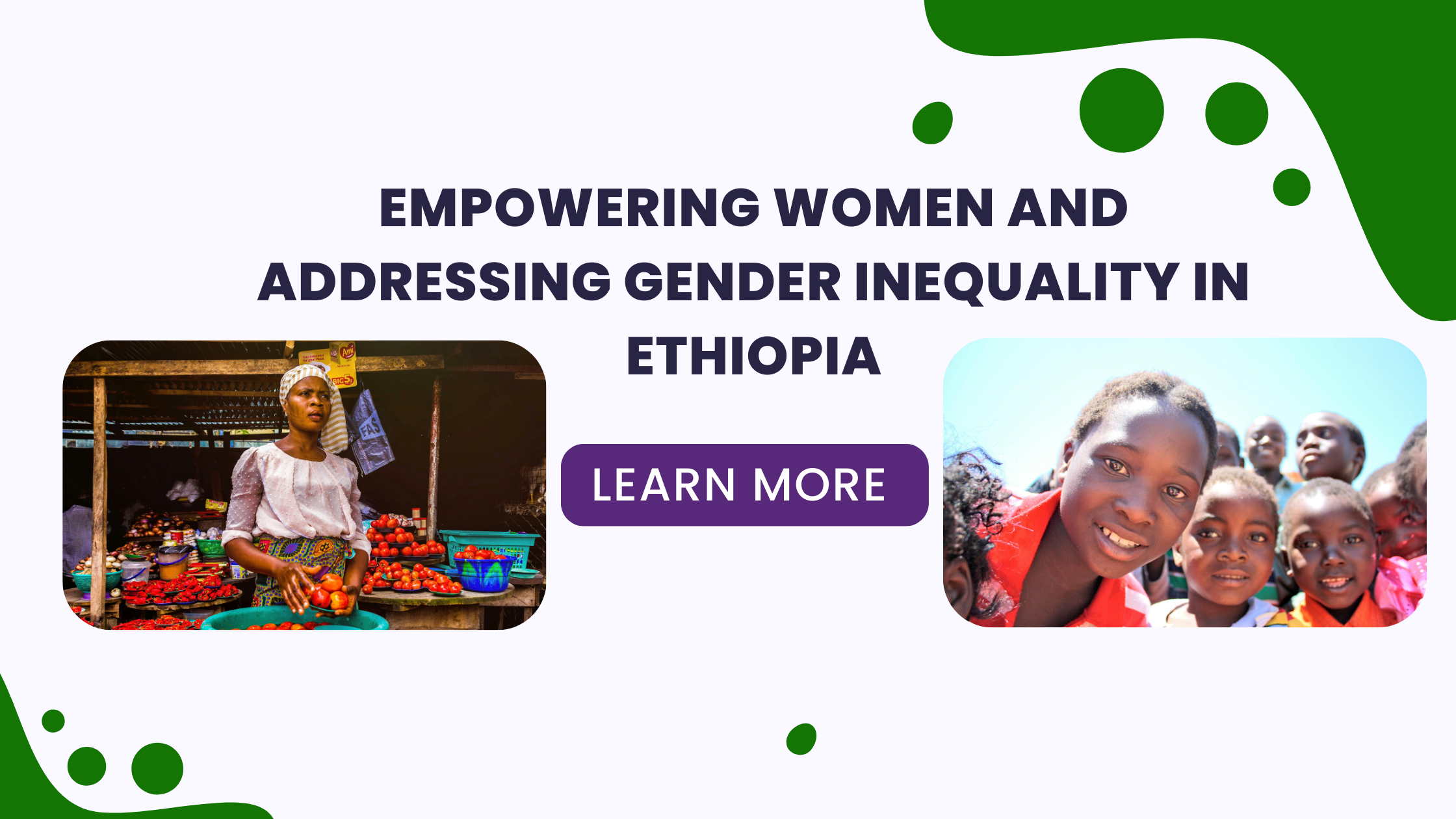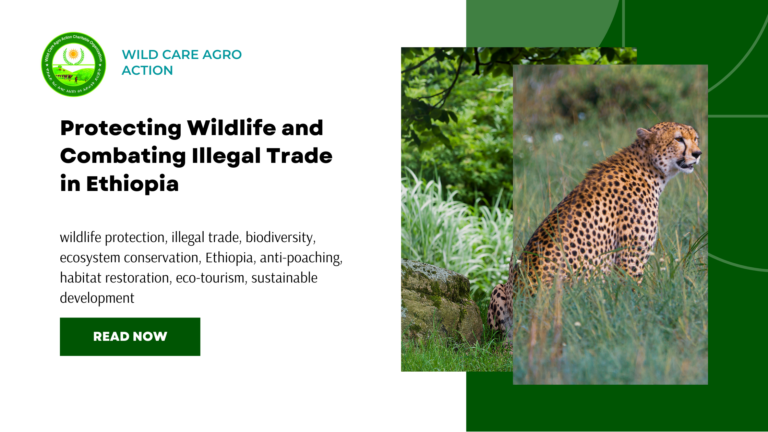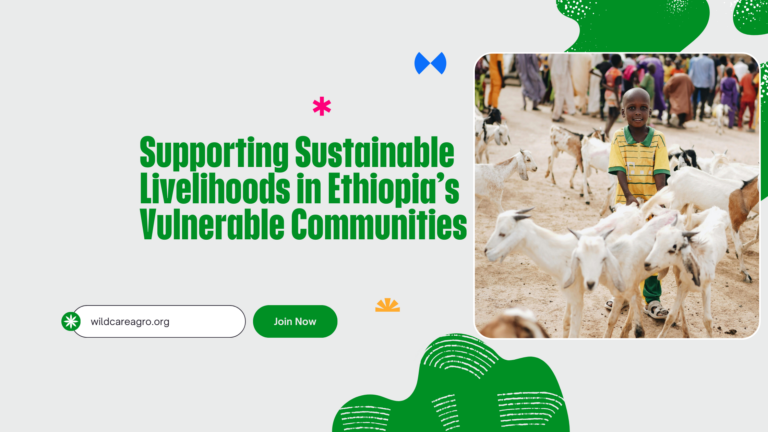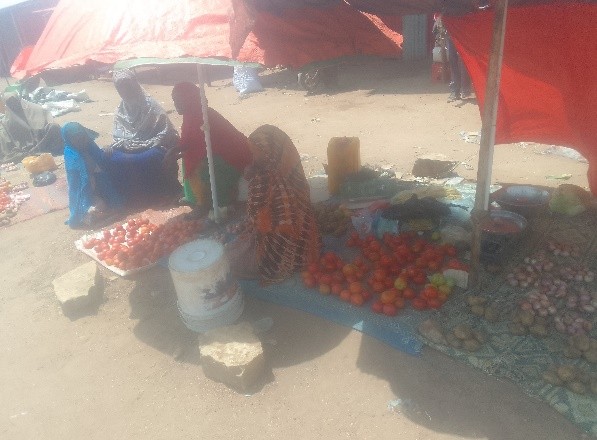Empowering Women and Addressing Gender Inequality in Ethiopia

Gender equality is a fundamental pillar of sustainable development, yet women and girls around the world, including Ethiopia, face significant barriers to achieving their full potential. At WILD CARE AGRO ACTION (WCAA), we are committed to removing these barriers and ensuring that women and girls have equal opportunities to contribute to and benefit from their communities’ development. Empowering women in Ethiopia is not only a moral imperative but also a key to unlocking economic growth and social progress.
This article explores the challenges of gender inequality in Ethiopia, the importance of women’s empowerment, and how WCAA’s initiatives are helping to create a more inclusive and equitable society.
Understanding Gender Inequality in Ethiopia
The Challenges Women Face
Despite progress in some areas, gender inequality remains a major challenge in Ethiopia. Women and girls, especially those living in rural areas, often face significant disadvantages when it comes to access to education, healthcare, economic opportunities, and decision-making power.
Some of the key challenges include:
- Limited access to education: In rural areas, girls are often expected to help with household chores and caregiving responsibilities, leading to higher dropout rates compared to boys. This limits their future opportunities and perpetuates the cycle of poverty.
- Lack of economic opportunities: Women are underrepresented in the workforce, and those who do work often face wage gaps, limited job opportunities, and lack of access to land or financial resources.
- Health challenges: Maternal health remains a major issue in Ethiopia, with high rates of maternal mortality and limited access to reproductive healthcare services, especially in rural regions.
- Cultural and social norms: Deeply rooted cultural norms often restrict women’s participation in leadership roles, and early marriage remains a common practice, further hindering women’s ability to pursue education or economic independence.
These challenges have a profound impact on the overall development of Ethiopia. When women are excluded from opportunities to learn, work, and lead, it holds back entire communities, slowing progress on poverty reduction and sustainable development.
Why Women’s Empowerment Matters for Community Development
Empowering Women to Break the Cycle of Poverty
Empowering women is essential to breaking the cycle of poverty. When women have access to education, healthcare, and economic opportunities, they can contribute more effectively to their families and communities. Educated and economically empowered women are more likely to invest in their children’s education and health, creating a ripple effect that benefits future generations.
Research shows that when women earn an income, they reinvest a larger portion of their earnings into their families and communities compared to men. This leads to better outcomes in areas such as nutrition, health, and education, creating stronger, more resilient communities.
Promoting Gender Equality for Economic Growth
Gender equality is not only a matter of fairness but also a driver of economic growth. Studies have shown that countries with higher levels of gender equality tend to experience stronger economic growth and development. By empowering women and promoting gender equality, Ethiopia can unlock the potential of half its population, contributing to national economic progress.
Moreover, women bring diverse perspectives and skills to the table, which are crucial for innovation and problem-solving. By ensuring equal participation of women in decision-making processes, Ethiopia can benefit from the creativity and leadership that women offer.
WCAA’s Initiatives to Empower Women and Address Gender Inequality
At WCAA, we are dedicated to addressing the root causes of gender inequality and empowering women in Ethiopia through targeted initiatives that focus on education, economic empowerment, and leadership development.
Education for Girls: Breaking Barriers to Learning
Education is the foundation of women’s empowerment, and at WCAA, we are committed to ensuring that girls in Ethiopia have access to quality education. Our programs focus on:
- Reducing dropout rates: We work with local schools and communities to create supportive learning environments for girls, addressing the barriers that prevent them from staying in school. This includes providing scholarships, school supplies, and mentorship programs to encourage girls to continue their education.
- Raising awareness about the importance of education: We engage with families and community leaders to raise awareness about the long-term benefits of educating girls, challenging cultural norms that prioritize boys’ education over girls’.
- Providing vocational training: For girls who are unable to pursue traditional education, we offer vocational training programs that equip them with practical skills in areas like tailoring, agriculture, and handicrafts, enabling them to earn a livelihood.
By ensuring that girls have access to education, we help them build the foundation for a brighter future, free from the constraints of poverty and gender discrimination.
Economic Empowerment: Supporting Women Entrepreneurs
WCAA’s women’s empowerment initiatives focus on improving economic opportunities for women, especially those in rural areas. We provide support through:
- Access to microfinance and loans: We help women entrepreneurs access small loans and financial services, enabling them to start or expand their businesses. These loans allow women to invest in income-generating activities such as farming, crafts, and small-scale trading.
- Training in entrepreneurship and financial literacy: Our training programs equip women with the skills needed to manage their businesses successfully. From financial management to marketing, we ensure that women have the tools to grow their businesses and become financially independent.
- Creating women-led cooperatives: We support the formation of women-led cooperatives, where women work together to produce and sell goods. These cooperatives not only provide economic opportunities but also foster a sense of community and solidarity among women.
By supporting women’s economic empowerment, WCAA helps them gain financial independence, improve their families’ living standards, and contribute to community development.
Promoting Leadership and Gender Equality
Leadership development is a key aspect of WCAA’s work in promoting gender equality. We believe that women should have an equal voice in decision-making processes at all levels, from the household to the national government. Our initiatives in this area include:
- Leadership training for women: We offer leadership training programs that equip women with the skills and confidence to take on leadership roles in their communities, businesses, and local governments.
- Advocacy for gender equality: WCAA advocates for gender equality in Ethiopia by working with government authorities and community leaders to develop policies that promote women’s rights and participation in decision-making. We also engage in public awareness campaigns to challenge harmful cultural norms and practices, such as early marriage and gender-based violence.
- Creating safe spaces for women: We provide safe spaces where women can come together to discuss their challenges, share experiences, and support one another. These safe spaces foster solidarity and empower women to advocate for their rights.
By promoting leadership and advocating for gender equality, we aim to create a society where women have an equal say in shaping the future of their communities and the country as a whole.
The Future of Women’s Empowerment in Ethiopia
Creating a Gender-Equal Society
At WCAA, we envision a future where women and girls in Ethiopia are free from discrimination and have equal access to opportunities. By empowering women and addressing gender inequality, we can create a society that values the contributions of all its members, regardless of gender.
However, achieving gender equality requires sustained effort and collaboration. We believe that governments, civil society, and individuals all have a role to play in promoting women’s rights and supporting initiatives that empower women and girls.
How You Can Support Gender Equality in Ethiopia
There are many ways you can help support gender equality and women’s empowerment in Ethiopia:
- Donate: Your contributions help fund our programs, providing education, economic opportunities, and leadership training for women and girls.
- Volunteer: Share your time and skills by volunteering with WCAA, either in Ethiopia or remotely. Your involvement can make a direct impact on women’s lives.
- Raise Awareness: Help us spread the word about gender equality by sharing our content on social media, organizing events, or participating in campaigns.
Together, we can create a future where gender equality is a reality for all women and girls in Ethiopia.



